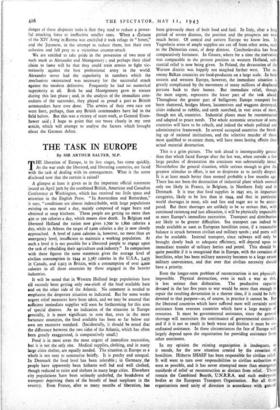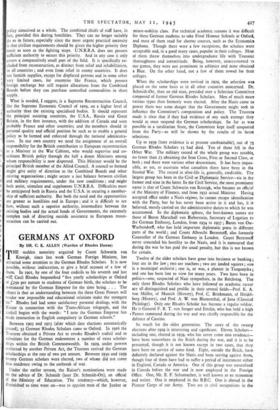THE TASK IN EUROPE
By SIR ARTHUR SALTER, M.P.
A glimpse at least is given us in the important official statement issued on April 3oth by the combined British, American and Canadian Conference at Washington, which has received too little space and attention in the English Press. " In Amsterdam and Rotterdam," it says, " conditions are almost indescribable, with large populations existing on one meal a day, mainly composed of sugar beets and obtained at soup kitchens. These people are getting no more than 45o to 50o calories a day, which means slow death. In Belgium and liberated Holland the ration now gives 1,7o0f to 1,800 calories a day, while in Athens the target of 2,000 calories a day is now closely approached. A level of 2,000 calories is, however, no more than an emergency level, insufficient to maintain a working population. At such a level it is not possible for a liberated people to engage upon the task of rebuilding their agriculture and industry." In comparison with these figures the same statement gives the average level of civilian consumption in 1944 at 3,367 calories in the U.S.A., 3,435 in Canada, and 2,923 in Britain, with a consumption of over 4,000 calories in all three countries by those engaged in the heavier industries.
It will be noted that in Western Holland large populations have till recently been getting only one-sixth of the food available here and on the other side of the Atlantic. No comment is needed to emphasise the desperate situation so indicated. But for some weeks urgent relief measures have been taken, and we may be assured that sufficient immediate supplies will soon be forthcoming for this area of special distress. As an indication of the situation in Europe generally, it Is more significant to note that, even in the more fortunate countries, the food available has been so far below our own not excessive standard. (Incidentally, it should be noted that the difference between the two sides of the Atlantic, which has often been greatly exaggerated, is comparatively small.)
Food is in most areas the most urgent of immediate necessities, but it is not the only one. Medical supplies, clothing, and in many large cities shelter, are equally needed. The situation in Europe as a whole is not easy to summarise briefly. It is patchy and unequal. In Denmark the food level has been tolerable ; in Germany the people have apparently been hitherto well fed and well clothed, though reduced to ruins and shelters in many large cities. Elsewhere city populations have been seriously underfed, the breakdown of transport depriving them of the benefit of local surpluses in the country. Even France, after so many months of liberation, has been grievously short of both food and fuel. In Italy, after a long period of severe distress, the position and the prospects are now much better. Of central and eastern Europe we know less. In Yugoslavia areas of ample supplies are cut off from other areas, such as the Dalmatian coast, of deep distress. Czechoslovakia has bees comparatively fortunate. In Greece, where for a time the starvation was comparable to the present position an western Holland, sub- stantial relief is now being given. In Poland, the devastation of the Warsaw district was happily not matched farther west. The ex- enemy Balkan countries are food-producers on a large scale. In both eastern and western Europe, however, the immediate situation is greatly complicated by the movement of many millions of displaced persons back to their homes. But immediate relief, though the most urgent, represents the lesser part of the task ahead. Throughout the greater part _of belligerent Europe transport has been shattered, bridges blown, locomotives and waggons destroyed, cities reduced to rubble, and earth scorched, in vast areas of most, though not all, countries. Industrial plants must be reconstructed and adapted to peace needs. The whole economic structure of some countries will have to be rebuilt, and indeed the whole political and administrative framework. In several occupied countries the break- ing up of national institutions, and the selective murder of those most qualified to re-create them, will have more lasting effects than actual material destruction.
This is a grim picture. The task ahead is incomparably greater than that which faced Europe after the last war, when outside a few large patches of devastation the continent was substantially intact. Nevertheless the general situation, while serious enough to give the greatest stimulus to effort, is not so desperate as to justify despair. It is at least much better than seemed probable a few months ago. There has not been the destruction of industrial plant which seemed only too likely in France, in Belgium, in Northern Italy and in Denmark. It is true that food supplies in 1945 are, in important categOries, likely to be less than in 1944, and that in particular world shortages in meat, oils and fats and sugar are to be antici- pated. But these shortages are unlikely to be so serious that, with continued rationing and just allocation, it will be physically impossible to meet Europe's immediate necessities. Transport and distribution are likely to be greater difficulties. Sea transport can indeed be made available as soon as European hostilities cease, if a reasonable balance is struck between civilian and military needs ; and ports will also be available. Internal transport, since railways will only be brought slowly back to adequate efficiency, will depend upon an immediate transfer of military lorries and petrol. This should be quite possible if it is recognised that in Europe, with the cessation of hostilities, what has been military necessity becomes to a large extent military convenience, and that over that civilian necessity should have a priority.
Even the longer-term problem of reconstruction is not physically impossible. Physical destruction, even in such a war as this, is less serious than dislocation. The productive capacity devoted in the last five years to war would be more than enough to repair the resulting devastation in a shorter time, if it could be fully devoted to that purpose—as, of course, in practice it cannot be. But the liberated countries which have suffered most will certainly need assistance from overseas countries which have a large margin of resources. It must be governmental assistance, since the general shortage will necessitate the continuance of governmental controls ; and if it is not to result in both waste and friction it must be co- ordinated assistance. In these circumstances the fate of Europe will largely depend upon the organisation for providing assistance from other continents.
In my opinion the existing organilation is inadequate, as it stands, for the new situation created by the cessation of hostilities. Hitherto SHAEF has been responsible for civilian relief. It will want to turn over responsibilities to civilian authorities 25 soon as possible, and it has never attempted more than emergency standards of relief or reconstruction as distinct from relief. There remain the Combined Boards, U.N.R.RA. and such embryonic bodies as the European Transport Organisation. But all these organisations need unity of direction in accordance with general policy conceived as a whole. The combined chiefs of staff have, in fact, provided this during hostilities. They can no longer suitably do so in future, especially since the most urgent practical necessity is that civilian requirements should be given the higher priority they merit as soon as the fighting stops. U.N.R.R.A. does not possess sufficient authority to secure this priority. And in any case it only covers a comparatively small part of the field. It is specifically ex- cluded from reconstruction, as distinct from relief and rehabilitation, in all countries ; and even from relief in enemy countries. It does not furnish supplies, except for displaced persons and in some other very limited cases, for countries like France, which possess foreign exchange but still require allocations from the Combined Boards before they can purchase controlled commodities in short supply.
What is needed, I suggest, is a Supreme Reconstruction Council, like the Supreme Economic Council of 1919, on a higher level of authority than the existing specialised bodies. It should represent the principal assisting countries, the U.S.A., Russia and Great Britain, in the first instance, with the addition of Canada and soon probably France and other countries; and the members should in personal quality and official position be such as to enable a general policy to be formed and enforced through the national administra- tions. In our own country we need the assignment of an overall responsibility for the British contribution to European reconstruction to a Minister in the War Cabinet, who would supervise and co- ordinate British policy through the half a dozen Ministers among whom responsibility is now dispersed. This Minister would be the principal British member of the Allied Council. A council so formed might give unity of direction to the Combined Boards and other existing organisations ; might secure a just balance between civilian and military requirements, under the new conditions ; and might both assist, stimulate and supplement U.N.R.R.A. Difficulties must be anticipated both in Russia and the U.S.A. in securing a member- ship of sufficient authority. But both the need and the opportunities are greater as hostilities end in Europe ; and it is difficult to see how, without such a superior authority, intermediate between the existing bodies and the actual heads of Governments, the extremely complex task of directing outside assistance to European recon- struction can be carried out.























 Previous page
Previous page